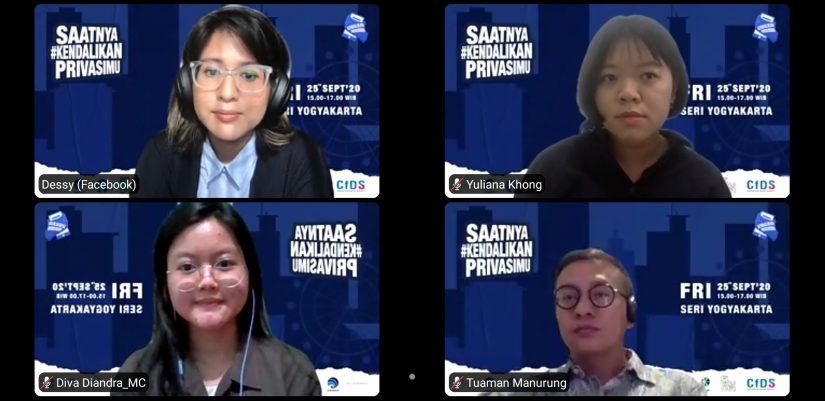
Yogyakarta, September 25th 2020—In order to discuss issues of privacy and personal data on the internet, the Ministry of Communication and Information, Facebook Indonesia. Pamflet, and Kelas Muda Digital (Kemudi) in collaboration with the Communication Student Corps (Komako) of UGM, they held a webinar “It’s Time to #Kendalikan Your Privacy: What We Need to Know about Privacy and Personal Data” Yogyakarta series. One of the research centers in the Faculty of Social and Political Sciences, the Center for Digital Society (CfDS), also participated in this webinar by presenting Yuliana Khong as a speaker.
Other than CfDS, this webinar also presented the other stakeholders to enrich the discussion’s perspective, such as the government—represented by Tuaman Manurung from Ministry of Communication and Information—the academics—represented by Novi Kurnia, Ph.D., the lecturer of the Department of Communication UGM, the social media platform—represented by Dessy Septiane from Facebook Indonesia, and civil society organization—represented by Fietyata Yuda from Forensika Digital Study Center of UII, with Diva Diandra as from Komako as the MC and Resa Tamaputra from Kemudi as the moderator. The event was held on Zoom Meeting and started at 03.00 p.m.
A few days before the event, the organizers also held several small events that were in line with the topics raised in the seminar. Not only that, Komako, Kemudi, and Pamflet have also uploaded infographics several times about personal data protection and privacy in the digital world in order to increase individual awareness.
Even so, it turns out that the government as the policy maker also has an equally important role as individual awareness regarding the protection of privacy and personal data in the digital realm, both in terms of education and regulation. This is as stated by Tuaman Manurung, that the Indonesian government has made four efforts to protect the personal data of its people, including regulatory support, monitoring of personal data protection (PDP) in the communication and information sector, preparing ecosystem implementation and development, and literacy education, as well as raising awareness regarding PDP.
Regarding the regulation of personal data protection in Indonesia, Tuaman said that until now there is no law that comprehensively regulates and serves as an umbrella for PDP in all sectors—these regulations are scattered, separated in the laws of each sector. Therefore, currently, the government is making a more comprehensive and stronger regulation for the protection of personal data in Indonesia. This issue was confirmed by Novi Kurnia. Other than discussing personal data protection regulations in various countries, Novi also explained many examples, data and cases related to violations, leaks, and personal data protection campaigns.
As a digital service provider, Facebook Indonesia, represented by Dessy Septiane, also made efforts to protect the personal data of its users, starting from education in the form of off-platform campaigns, to increasing control, policies and platform arrangements. To be clearer, Dessy displayed the latest privacy settings offered by Facebook, Instagram, and Whatsapp.
Although various parties have made efforts to protect personal data, unfortunately the public—in this context, especially students—still do not have a high level of awareness regarding their digital security. Based on research conducted by CfDS, and presented by Yuliana Khong, content creation skills and knowledge of device security are at the lowest score of all digital competency levels. The result showed that only 31.58% of respondents regularly check security features and device configuration. Yuliana also offered several universal solutions that can be done by various parties in increasing awareness regarding digital security, including protection of personal data and privacy.
In more detail, Fietyata Yudha explained some tips that can be done by individuals in improving their own digital security. It can be started from checking your social media accounts, regularly checking email, being more careful with important documents, avoiding using free wifi, using more complicated passwords, paying attention to and not allowing access to unimportant cookies, using two factor authentication, to using additional security applications such as antivirus.
The explanations from the speakers were followed by a question and answer session from the participants which had previously been conveyed through the comments column and QnA. With the answers to these questions, the speakers took turns delivering their closing remarks before the moderator finally closed the discussion. After taking a group photo, the webinar officially ended at 05.35 p.m. For those who could not join the event could watch the rerun video on the Pamflet Generasi YouTube channel.
